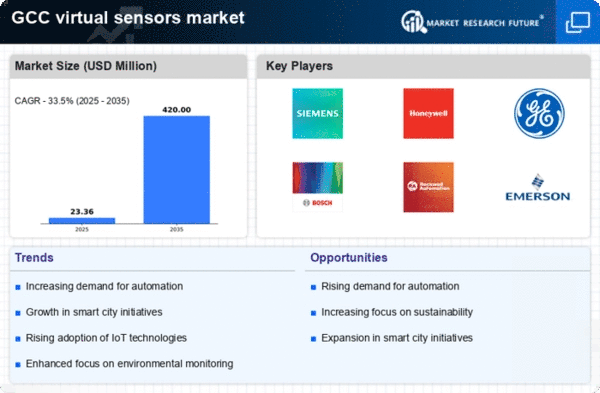Rising Demand for Automation
The virtual sensors market is experiencing a notable surge in demand for automation across various sectors in the GCC. Industries are increasingly adopting automated systems to enhance operational efficiency and reduce human error. This trend is particularly evident in manufacturing and logistics, where virtual sensors facilitate real-time monitoring and data collection. According to recent estimates, the automation sector in the GCC is projected to grow at a CAGR of approximately 15% over the next five years. This growth is likely to drive the virtual sensors market, as businesses seek to integrate advanced technologies that streamline processes and improve productivity. The ability of virtual sensors to provide accurate data without the need for physical sensors makes them an attractive option for companies aiming to optimize their operations.
Advancements in Data Analytics
The virtual sensors market is benefiting from significant advancements in data analytics technologies. As organizations in the GCC increasingly rely on data-driven decision-making, the demand for virtual sensors that can provide actionable insights is on the rise. Enhanced data analytics capabilities allow for the processing of vast amounts of information collected by virtual sensors, leading to improved forecasting and operational strategies. The market for data analytics in the GCC is projected to reach $5 billion by 2026, indicating a strong correlation with the growth of the virtual sensors market. This synergy between data analytics and virtual sensors is likely to foster innovation and create new opportunities for businesses seeking to leverage data for competitive advantage.
Growing Focus on Cost Efficiency
Cost efficiency remains a pivotal driver for the virtual sensors market in the GCC. Organizations are increasingly seeking solutions that minimize operational costs while maximizing output. Virtual sensors, which eliminate the need for physical installations and maintenance, present a compelling case for businesses aiming to reduce expenses. The potential savings associated with using virtual sensors can be substantial, with estimates suggesting a reduction in costs by up to 30% in certain applications. This focus on cost efficiency is particularly relevant in sectors such as oil and gas, where operational expenditures are closely monitored. As companies strive to enhance their bottom line, the virtual sensors market is likely to see sustained growth as a viable alternative to traditional sensing methods.
Integration with Smart Technologies
The integration of virtual sensors with smart technologies is emerging as a key driver for the market in the GCC. As industries adopt smart solutions, the need for virtual sensors that can seamlessly connect with other devices and systems is becoming increasingly apparent. This integration facilitates enhanced monitoring, control, and automation capabilities, which are essential for modern industrial applications. The smart technology market in the GCC is expected to grow at a CAGR of around 12% over the next few years, further propelling the virtual sensors market. The ability of virtual sensors to operate within interconnected environments positions them as a critical component in the evolution of smart industries, thereby indicating a promising future for the market.
Government Initiatives and Regulations
Government initiatives in the GCC are playing a crucial role in shaping the virtual sensors market. Various regulatory bodies are promoting the adoption of smart technologies to enhance infrastructure and public services. For instance, initiatives aimed at smart city development are encouraging the integration of virtual sensors in urban planning and management. The GCC governments are investing heavily in digital transformation, with budgets exceeding $10 billion allocated for smart technology projects. This investment is expected to create a favorable environment for the virtual sensors market, as public and private sectors collaborate to implement innovative solutions. The alignment of government policies with technological advancements suggests a robust growth trajectory for the virtual sensors market in the region.
















